In which we learn more of Theo Waitley, the book currently known as George, and why e-ARCs are awesome: Interview with Sharon Lee and Steve Miller, Part II
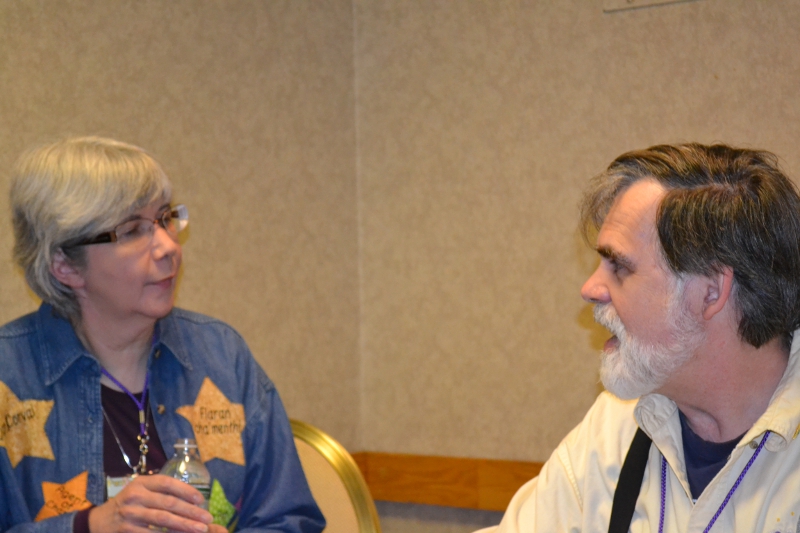
The second and final installment in the interview transcripts from PortConMaine, featuring Sharon Lee and Steve Miller, who didn’t make too much fun of their interviewer’s anxiety to read their books.
Since we were talking about Theo Waitley, maybe you could talk a little bit more about what it
was like to write Fledgling and Saltation as serials. I know that you discussed this in a panel
yesterday, but maybe you could give us just a condensed version.
Lee: Once upon a time, we were writers, and we were writing for an imprint called Meisha
Merlin, out of Georgia. And we worked for them for, oh ten years, and then they got in trouble,
as publishers do from time to time, and they stopped paying us. Long about the end of 2006,
we realized that they weren’t ever going to pay us, at all. And they owed us a lot of money.
And we realized that we lived in Maine, and living under a bridge in Maine in January was not
a good thing. The cats would not like it. So we decided that we needed to make money, and
the only thing we knew how to do was write. And we said to ourselves, ‘How on earth are we
going to survive the winter?’ And we said ‘I know, we’ll write a novel! And we’ll give it away
for free on the web! And we’ll – ’ There’s a walk-in character at the end of I Dare, called Theo
Waitley. When the characters are all – the story is wrapping up, for I Dare, and the characters
are getting ready to pack house and move, a pilot kind of staggers into the garden, having just –
having flown very hard, and says, ‘I’m here to see the Delm of Korval.’ And the Delm of Korval
says, ‘Well, we’re here. What’s up? You have a problem?’ And she says, ‘Yes, it’s kind of
complicated,’ and that’s where the book ends. And that pilot is Theo Waitley, and we decided
that since people had, after reading I Dare, gone ‘Ahhhhh, ok. Wait! Who is this?’ we would tell
them who that was. So we started with Theo, and we started to do a novel of exploration. In a
way, it was a perfect novel to do on the web because it follows one character very closely. It’s
not a first-person book, but it’s a very tight third. It starts with a naive character to whom things
happen, and she needs to figure stuff out, so the reader can learn about the universe through –
as the character is learning about the universe. One chapter followed another. Unfortunately,
because of the web situation – our situation, our guarantee to our readers was ‘We will put up
a chapter every Monday at noon, as long as the previous chapter has earned $300.’Miller: In donations.
Lee: In donations, yes. ‘If it doesn’t earn $300 in donations, you wait until next
Monday, or – ‘ Ok. That backfired on us because the book was paid for before we posted the
third chapter. So we were – every Monday we had to put up a – a chapter. That led to a kind of
an episodic treatment, but it also led to micro-attention, in a way that we wouldn’t have written a
novel, had we written it “privately.” Writing it “out loud” on the web, what happened, in a word,
was that Fledgling became two books. It became Fledgling and Saltation, because we were
concentrating on detail so much. But that was – it was fun, in a bizarre kind of a way.Miller: And, as somebody who had to do most of the typing [Lee laughs] for Fledgling, because
we do our role-play, what would be – what would be happening is that, at least when we were
doing Fledgling, it changed later slightly for Saltation. When we were doing the early parts of
Fledgling, we had a basic character, we had a basic situation, I would be doing 2500 finished
words – NOT finished words, a week, actually. Sometimes that meant I sat down on Thursday,
and got it done, and sometimes I was still working on Monday morning at 10:55 and it needed to
be up at noon. But we still got some opportunity at that point to be doing our role-playing. Later
on, Sharon had – we had pitched a book to Baen through our – through our agent, Jen, and Jen
came back and said, ‘Listen, they’ve taken this fantasy book!’ So what happened is that we
ended up with over-lapping deadlines, and Sharon was writing the fantasy book, actually two
fantasy books, Duainfey and Longeye, while I was writing Theo Waitley. So it became very
difficult to do – to do our standard play-acting because Duainfey was an extremely dark hard
fantasy book with sado-masochism in it, which was really hard to deal with, with Theo [Miller
mimes a perky teen, Lee laughs] as a young and naive person, so that did put some – that did
make it a challenge for awhile.Let’s see. Well, what’s next for you? I know you’re working on Dragon Ship, but what’s a little
bit further on the horizon?Lee: Well, Steve is working – we have three books under contract with Baen right now. Dragon
Ship, and Trade Secret, and the book that is now being called George, because I don’t have
a title for it. And George introduces a new character. And what I’m doing is I’m working on
George, Steve is working on Dragon Ship, the idea is to meet in the middle and then we’ll swap.
And then we’ll go on to Trade Secret, which is a continuation of Balance of Trade. People
have been asking for a continuation of Balance of Trade for quite a number of years, and I kept
saying, ‘It’s a stand-alone novel! I’m not doing them!’ But Steve thinks he has an idea, so he
brought that to the table, and he’ll be the gatekeeper on that one.Miller: Actually, what happened is that we presented the proposal to Toni Weisskopf at Baen,
and she was willing to accept that idea as being an idea. So that’s a little – a little better
than ‘Gee I think I can’ [Lee laughs] because she thinks I can, too. And it really is – selling
novels these days is getting very difficult. People are apparently having to write the complete
book before they try to sell it, in many cases, now. And we had gotten – oh, spoiled, when we
first sold our books to Meisha Merlin. They’d come along after the first three had been sold to –
to Del Rey and released. We did that, Steve Pagel called us up, said he was interested in the
three books, and we said ‘Well, wait! There’s another one!’ and he said Ok, ‘I’ll take it!’ That
was Plan B, and he hadn’t seen it. And then Sharon finished explaining ‘No, no, actually, there
– there’s seven books in that.’ And he said, ‘Well, I’ll just take them all, ok?’ So we got rather – we
got rather spoiled, and then – and dealing with Toni Weisskopf, she has – she had taken a series
that was a standing series, at that point, of ten –Lee: Yup.
Miller: – of ten, with the understanding that we would be doing some more. She took Fledgling
and Saltation – not quite on ‘Ok, you’ve got another book,’ but basically on, ‘Ok, you’ve got four
sentences here, that’s good enough for me.’ So we’ve had some – some success with that.
Balance of Trade I actually think I had to write about a page and a half. Duainfey and Longeye
went –Lee: Sold on proposal.
Miller: -sold on proposal as well.
Lee: Carousel Tides, which is my stand-alone – well, my single-author fantasy – which is set
in Old Orchard Beach, I wrote the whole book before we even tried to send it around. Some
books you just need to write.Sure. That’s all that I have. Did you have any –
Miller: Grand finale?
Lee: Grand finale? Baen website.
All right. – Is there anything else you wish to plug?
Miller: Well –
Lee: Yes! Our publisher is Baen Books, and Baen Books is not only paper books, but it also
is electric books, so that you can go over to Baen Books, and as in Smashwords, download –
download a book in 15,000 formats, and the other thing that Baen does and Smashwords does,
and it’s really cool, is that you can have a library on their server. So if you, like, drop your Nook
in a koi pond, you don’t lose your books. You can go and download them again, and have them
with you. So Baen has been really in the forefront of doing electronic books for quite some
number of years, and they do a thing called an e-ARC, which is basically what we turn in to
Toni, after she has said, ‘Ok, fix this hole, fix this hole, and this character’s name changed in – in
chapter 13, so fix that.’ After those corrections have been done, that’s what the e-ARC is, and
so people who can’t wait for the story [gestures to interviewer] can download it an e-ARC and get it,
oh, about six months ahead of the copy-edited final book.Miller: That goes through webscription.net, … and the Baen website itself is at baen.com ….
We’ve been very pleased with the way Baen has been getting behind the books, and the way
that they do support the electronic – the electronic thing. And it’s been – apparently, our fans like
it, too, because they’ve been able to get in early with the e-ARCs. There’s – I don’t think there’s
another publisher doing that kind of thing right now, which gives them in some cases four to six
months ahead, with the understanding that the e-ARC is not the final copy. The final copy may
be different by ten words, it may be different by 40,000. It’s not likely to be different by 40,000,
with us, but –Lee: We usually send in a complete book.
Miller: But it’s been useful for – for all of us, I think.
Well, thank you very much, Sharon Lee and Steve Miller, for your time, and for this lovely
interview, and we’ll look forward to what comes from you in the future.Lee: Thank you.
Miller: Thank you very much.
This is Nerd Caliber, signing off.
Contact Info:
Twitter: @ClanKorval
Livejournal: Journeyman and Eagles over the Kennebec
Their websites: Korval, Pinbeam Books, and a new project, Splinter Universe.

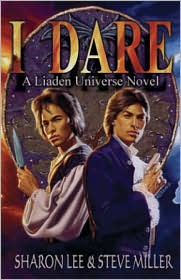
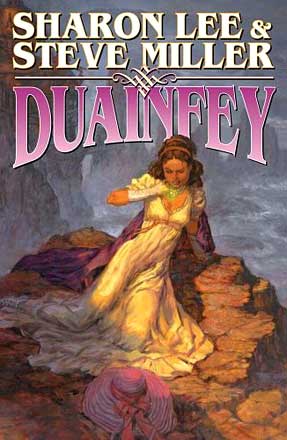
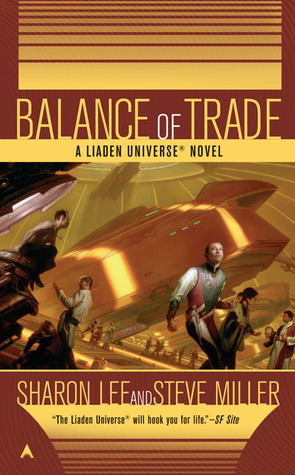
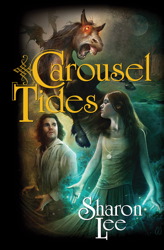
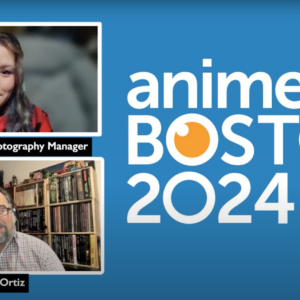

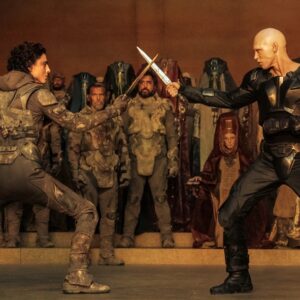
Hey, thanks for the article.Really looking forward to read more. Really Great.